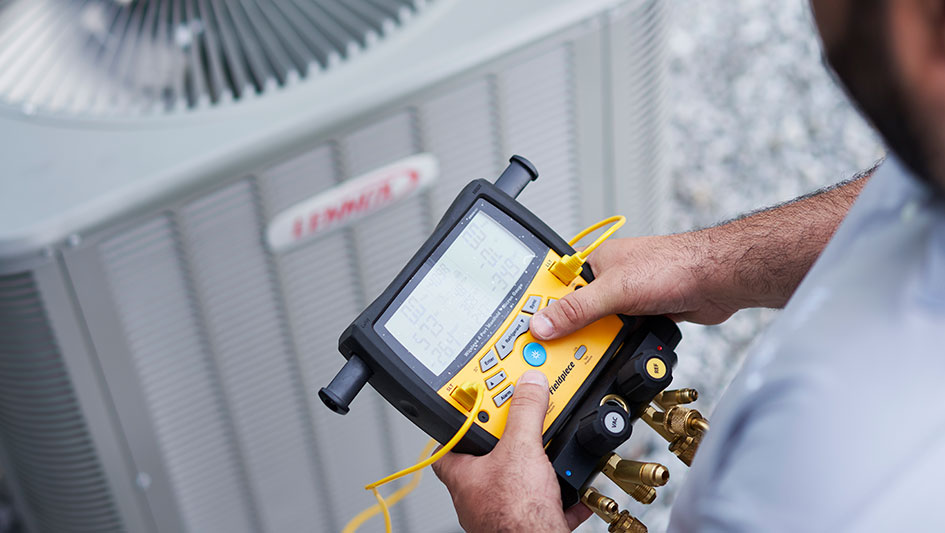
If you’re considering a new, high-paying career, look no further than heating, ventilation and air conditioning. HVAC is one of the most rapidly growing careers you can find, according to the U.S. Bureau of Labor Statistics, which expects careers in this industry will expand by 13 percent by 2028.
There are a couple of reasons why these jobs are expanding so rapidly. One is homeowners taking advantage of government refunds to upgrade to more energy-efficient comfort systems. Then there’s the ban on R-22 Freon® refrigerants, which influences old equipment. In conclusion, there’s the red-hot home market and a home shortage that’s driven a bump in new construction houses.
One of the most needed careers is working as an HVAC technician. Discover about what they do, how to become one and about how much you can expect to receive.
What Is a Professional HVAC Technician?
An HVAC technician is a person who fixes, installs and maintains heating and cooling units. Most serve both homeowners and business owners. And, most important, you’ll be knowledgeable about:
- Air conditioners
- Furnaces
- Mini-splits and heat pumps
- Thermostats and home zoning
- Indoor air quality products such as air filters and air purification systems
Some are HVAC-R techs, which means they also can do refrigeration.
Is Working in HVAC Difficult?
While HVAC can be physically demanding, it can also be highly satisfying. As a technician you should be able to:
- Work in uncomfortable settings, including tight or dirty spaces.
- Work in hot or cold areas because equipment is often outdoors.
- Work evenings, weekends and overtime during peak times.
One of the biggest misconceptions about HVAC is that it’s a blue-collar career. You need a specific skill set, extensive education and ongoing certification.
It’s an excellent career choice if you want to:
- Not be saddled with excessive educational debt.
- Avoid sitting at a desk or in an office.
- Have job security knowing your position can’t be outsourced.
- Work as your own boss and have your own prosperous business.
How You Can Start Your Careers as an HVAC Professional
To become an HVAC technician, you’ll need a high school diploma or GED, plus comprehensive instruction. Other more specialized (and higher paying) HVAC jobs typically must have extra schooling or endorsements.
You can be certified by attending classes at a community college or trade school. How long it takes to become an HVAC technician is linked to the program, which is often six months to two years. Your employer may also expect NATE certification. This stands for North American Technician Excellence, this industry-leading endorsement improves your technical know-how to help you better serve customers.
Career Explorer reports that technicians who have expertise with tablets, electronics and troubleshooting will be in great demand as equipment becomes more technologically advanced.
Another perk of working in HVAC is little to no instructional debt.
According to Midwest Technical Institute, attending a technical or trade school often is around $15,000. A community college typically is around $5,000 annually. By comparison, the average student debt for a bachelor’s degree is $25,921.
A Typical Day of an HVAC Technician
Your work schedule could vary depending on your situation. If you perform repairs, you might work early, late or be on call. If you work in construction/home building or management, you might have more of a fixed schedule during usual business hours.
As a technician, you’ll visit different locations for repair, maintenance or installation jobs. Some tasks might require more time than others, so the number of calls you can take care of could vary.
As we mentioned previously, you should be comfortable working outdoors in extreme weather, in addition to dirty or cramped spaces. If you work in a customer-facing role, good customer service skills are always an advantage.
Typical Salary Rates for {Professional Technicians|Technicians|Full-Time Technicians and Other Careers in HVAC
As HVAC is a rapidly expanding field, your salary will mirror it. The national average salary for an HVAC technician is $49,242, according to ZipRecruiter. Top earners get between $56,600 and $68,000. However, salaries might be different based on your location and its cost of living.
Other than owning your own business, there are a few additional career opportunities. These can be:
HVAC manager, $72,515 average salary
HVAC service manager, $71,176 average salary
Where HVAC Technicians Are in High Demand
HVAC technicians are needed across the nation, but even more so in Florida, California, Texas, New York and Illinois. According to hvacclasses.org, these states employ the most HVAC workers and are going through explosive construction growth. Here’s why:
- Florida: Hurricanes, school and healthcare facilities.
- California: Wildfires, transportation, energy and utility upgrades.
- Texas: Hurricanes, energy, utility and other infrastructure projects.
- New York: Residential and infrastructure upgrades.
- Illinois: Companies relocating to the Chicago area.
Where HVAC Technicians Will Be in High Demand in the Future
Projections Central, who makes long-term occupational projections, expects these states to have the greatest demand for technicians by 2028:
- Utah, 31.1%
- Colorado, 29.7%
- Nevada, 27.9%
- Arizona, 21.4%
- Iowa, Oregon and Montana, 18.5%
- Arkansas, 16.3%
- Florida, 16.2%
- South Carolina, 16%
- Texas, 15.9%
- Idaho, 15.7%
- Washington, 15.6%
- North Carolina, 15.5%
- Tennessee, 15.2%
- Wyoming, 14.3%
- Nebraska, 13.9%
- Indiana, 13.8%
- North Dakota, 13.8%
Here’s where the greatest number of new positions during that time frame are forecasted to be:
- Florida, 5,420
- Texas, 5,530
- California, 4,100
- North Carolina, 2,510
- New York, 2,290
- Colorado, 2,000
- Ohio, 1,550
- Pennsylvania, 1,510
- Virginia, 1,500
- Tennessee, 1,360
- Washington, 1,290
- Georgia, 1,270
- New Jersey, 1,170
- Utah, 1,170
- South Carolina, 1,1060
- Indiana, 940
- Maryland, 820
- Missouri and Arizona, 810
- Michigan, 780
Weather and economic improvement is anticipated to contribute to growth in these states, according to hvacclasses.org.
Kickstart a Career in HVAC with Woody's Sudden Service
HVAC technicians are needed across the nation and in Manassas. To discover more about our openings, see our careers page or reach us at 703-291-0095 right away!
